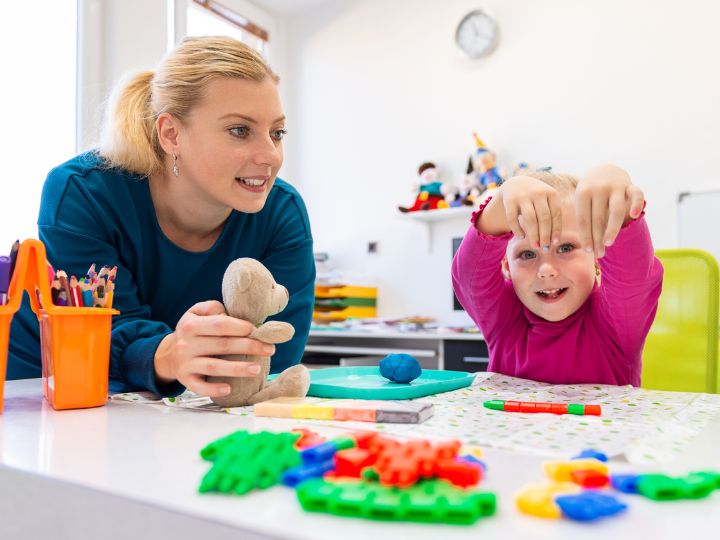Every parent wants their child to grow up confident, independent, and socially connected. However, not every child finds this path easy. For many, challenges with coordination, communication, or daily routines can affect how they learn, interact, and feel about themselves.
These everyday struggles, whether physical, emotional or social, can significantly impact a child’s development and overall quality of life. That’s where paediatric occupational therapy steps in—not just as an intervention, but as a crucial support system that empowers children to build key life skills.
This therapy doesn’t just address delays—it nurtures each child’s potential and supports their journey to become more capable, coordinated, and confident in daily life.
What is Paediatric Occupational Therapy?
Helping Children Do Everyday Things
Paediatric occupational therapy focuses on helping children develop the physical, emotional, sensory, and cognitive skills required for everyday tasks. These may include dressing, eating, playing, writing, using tools, and interacting with peers or adults.
Occupational therapists assess each child’s individual needs and challenges, then create a tailored plan to help them succeed. Whether it’s supporting a child to improve fine motor skills or guiding them through emotional regulation, therapy is always child-centred and goal-oriented.
This approach ensures that therapy is not only effective but also engaging, enjoyable, and aligned with the child’s natural environment—whether at home, school, or in the community.
Building Confidence Through Therapy
Empowering Kids with Independence
When a child struggles with tasks their peers seem to do effortlessly, it can lead to frustration, low self-esteem, and withdrawal from social settings. Over time, this may affect their willingness to try new activities or communicate their needs.
Paediatric occupational therapy gently guides children through tasks and activities that suit their skill level, helping them build competence at their own pace. With each small success—whether it’s learning to tie shoelaces, feed themselves, or finish a classroom task—their confidence grows.
Therapists celebrate these milestones, using encouragement and play to foster a sense of pride and achievement in children. These positive experiences build a stronger emotional foundation for future challenges.
Encouraging Positive Emotional Development
Beyond physical skills, therapy also supports emotional resilience. Children learn how to manage frustration, anxiety, or sensory overwhelm through structured routines and calming strategies. They begin to recognise their feelings, cope with changes, and feel more secure in unfamiliar environments.
As they gain greater self-regulation and emotional control, children become more willing to engage socially, explore new activities, and take healthy risks—essential building blocks of confidence and growth.
Enhancing Coordination and Physical Skills
Developing Fine and Gross Motor Skills
Good coordination is crucial for daily tasks, from brushing teeth to writing in school. Children who experience difficulties with posture, grip, balance, or motor planning may struggle with these fundamental activities.
Paediatric occupational therapists use fun, interactive exercises to support:
- Fine motor skills (e.g., grasping pencils, doing up buttons, cutting with scissors)
- Gross motor skills (e.g., climbing, jumping, balancing, catching)
- Hand-eye coordination and spatial awareness
These tasks are often delivered in play-based formats, turning therapy into an engaging, pressure-free experience. Through regular sessions, children strengthen muscles, improve coordination, and gain more control over their movements.
Supporting Everyday Functioning
With improved coordination, children can carry out everyday tasks more efficiently and independently. Whether it’s dressing themselves, packing a school bag, or sitting upright during class, these physical improvements contribute to a smoother daily routine and better participation in both home and school life.
As children achieve more independence, their sense of capability and overall wellbeing increases.
Developing Communication and Social Interaction
Communication Beyond Words
Communication isn’t limited to talking. It involves listening, reading body language, taking turns, and understanding emotions. Children with social or sensory challenges may find it hard to interpret non-verbal cues, engage in conversations, or express their needs clearly.
Paediatric occupational therapy helps children:
- Improve attention, listening, and comprehension
- Follow instructions with greater accuracy
- Recognise social cues and facial expressions
- Express feelings through words, visuals, or gestures
Working with Social Skills in Real Life
Therapists use structured play, group tasks, and real-world simulations to practise social communication. Children learn how to navigate friendships, resolve conflicts, and participate in team activities—skills that are vital both in school and in daily life.
These practical scenarios give children the tools to interact meaningfully and feel more connected to those around them.
A Family-Centred Approach
Parents as Partners
One of the most powerful aspects of paediatric occupational therapy is its collaborative nature. Therapists work closely with families to ensure the strategies used during sessions can also be applied at home or school.
Parents are empowered with tools, routines, and communication strategies to reinforce their child’s progress.
They’re encouraged to celebrate small wins and implement therapeutic activities during daily routines—making therapy a natural part of family life.
Holistic and Individualised Support
No two children are the same. Therapy is always tailored to the child’s individual strengths, needs, and interests. Some children may require support for emotional regulation, while others benefit from sensory integration or motor development work.
This holistic and flexible approach ensures that every child receives the right kind of help, at the right time, in the way that best suits them.
When to Consider Paediatric Occupational Therapy
You may want to speak with an occupational therapist if your child:
- Has trouble with self-care tasks like dressing, feeding, or toileting
- Avoids physical activities or messy play
- Struggles with focus, routine, or task completion
- Finds it difficult to communicate or engage socially
Early intervention can make a big difference in helping children build strong foundations that last a lifetime.
Every child deserves the chance to thrive, feel capable, and enjoy meaningful relationships.
Paediatric occupational therapy supports this by helping children gain the skills they need to move confidently, communicate effectively, and participate fully in everyday life.


